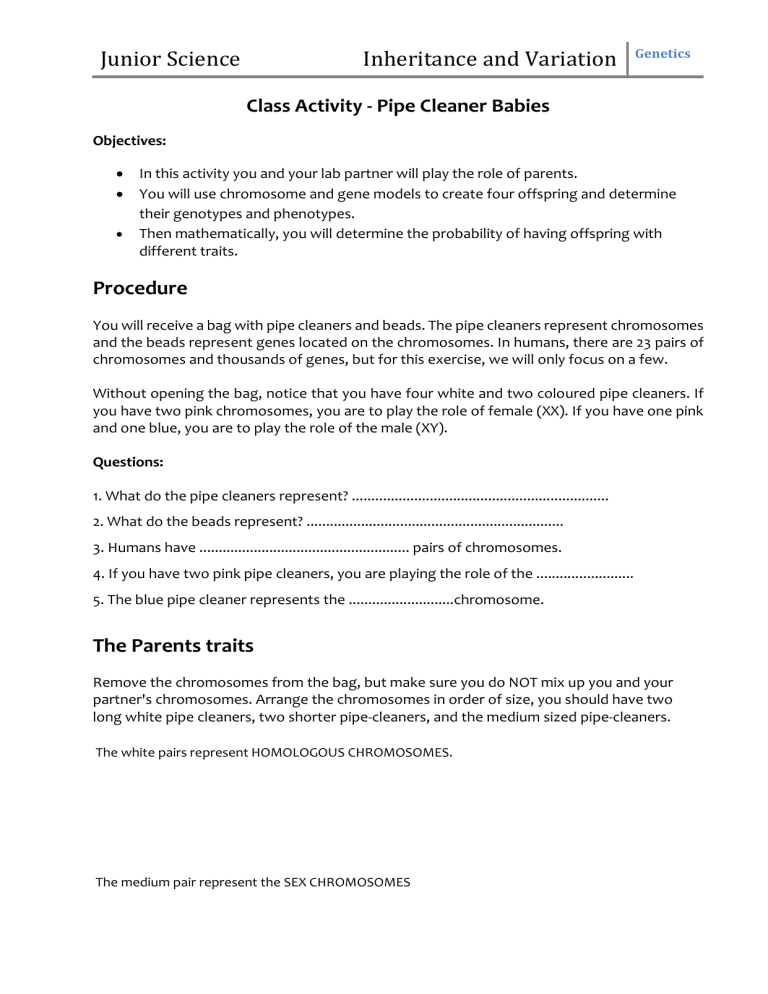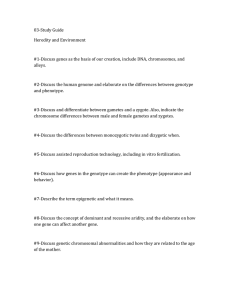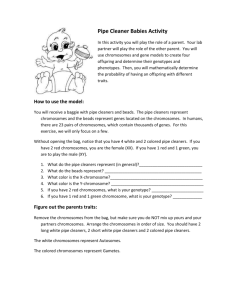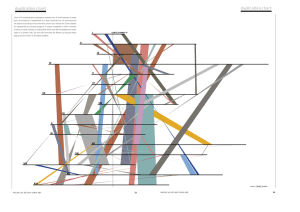
Junior Science Inheritance and Variation Genetics Class Activity - Pipe Cleaner Babies Objectives: In this activity you and your lab partner will play the role of parents. You will use chromosome and gene models to create four offspring and determine their genotypes and phenotypes. Then mathematically, you will determine the probability of having offspring with different traits. Procedure You will receive a bag with pipe cleaners and beads. The pipe cleaners represent chromosomes and the beads represent genes located on the chromosomes. In humans, there are 23 pairs of chromosomes and thousands of genes, but for this exercise, we will only focus on a few. Without opening the bag, notice that you have four white and two coloured pipe cleaners. If you have two pink chromosomes, you are to play the role of female (XX). If you have one pink and one blue, you are to play the role of the male (XY). Questions: 1. What do the pipe cleaners represent? .................................................................. 2. What do the beads represent? .................................................................. 3. Humans have ...................................................... pairs of chromosomes. 4. If you have two pink pipe cleaners, you are playing the role of the ......................... 5. The blue pipe cleaner represents the ...........................chromosome. The Parents traits Remove the chromosomes from the bag, but make sure you do NOT mix up you and your partner's chromosomes. Arrange the chromosomes in order of size, you should have two long white pipe cleaners, two shorter pipe-cleaners, and the medium sized pipe-cleaners. The white pairs represent HOMOLOGOUS CHROMOSOMES. The medium pair represent the SEX CHROMOSOMES Junior Science Inheritance and Variation Genetics Eye Colour (longer white pipe cleaners) Hair Colour (shorter white pipe cleaners) Dark Green bead represents the dominant gene - brown eyes (B) The Brown bead represents the dominant gene- dark hair (D) Blue bead represents the recessive gene blue eyes (b) The yellow bead represents the recessive gene - blonde hair (d) BB = brown eyes DD= dark hair Bb = brown eyes Dd = dark hair bb = blue eyes dd = blonde hair Allele is alternative forms of a gene that arise by mutation and are found at the same place on a chromosome. Genotype is the term is used for the genetic makeup of an organism i.e. the pair of genes controlling the characteristic. Example Dd, the person has both alleles for hair colour Phenotype is the actual physical appearance of that trait in the individual. Example Brown or Dark hair Questions (1) Mother eyes What is her genotype? ........................ What is her Phenotype? ........................ Fathers eyes What is his genotype? ........................ What is his Phenotype? ......................... Mother hair What is her genotype? ........................ What is her Phenotype? ........................ Fathers Hair eyes What is his genotype? ........................ What is his Phenotype? ......................... Create punnett squares to find the possible variations in the offspring Hair colour Eye Colour Junior Science Inheritance and Variation Genetics Sex Linked Genetic Disorders Sex-linked diseases are passed down through families through one of the X or Y chromosomes. X and Y are sex chromosomes. Dominant inheritance occurs when an abnormal gene from one parent causes disease, even though the matching gene from the other parent is normal. The abnormal gene dominates. In recessive inheritance, both matching genes must be abnormal to cause disease. If only one gene in the pair is abnormal, the disease does not occur or it is mild. Someone who has one abnormal gene (but no symptoms) is called a carrier. Carriers can pass abnormal genes to their children. The term "sex-linked recessive" most often refers to X-linked recessive. Haemophilia (X – chromosome) The orange bead represents the dominant gene (normal) The red bead represents the recessive gene (haemophiliac) In girls: HH = normal Hh = normal (carrier) In boys: H = normal h = haemophiliac hh = haemophiliac What is mom's genotype? ........................... Is she a carrier? ............................................. What is dad's genotype? ............................ Is he a Haemophiliac?..................................... Why doesn't dad get two alleles for this trait?........................................................................ .................................................................................................................................................... Time to Start Your Family The dad places one set of the homologous pairs (Eye colour) behind his back, with a chromosome in each hand. The mom picks the hand she wants for the child. Lay this chromosome on the table in front of you and set the other aside. Repeat this procedure for the other homologous pair (Hair colour) and for the sex chromosomes. It should be noted that if the blue chromosome gets chosen from the sex chromosomes, the child in this cross is going to be a boy. Now the "mom" places one set of the homologous pairs behind her back and the male chooses. The chromosomes chosen and set on the table in front of you are the genes your first child received. Junior Science Inheritance and Variation Genetics Determine the Traits of Your First Child Arrange the chromosomes into homologous pairs and figure out what phenotypes (appearance or trait) the offspring has. Questions What is the sex of the child? ..................................... What colour eyes does the child have? Genotype................................ Phenotype …………………………. What colour hair does the child have? Genotype................................ Phenotype ………………………….. Is the child a haemophiliac? ............................................................ Is the child a carrier for haemophilia? ............................................................ Data Collection Record your results on the data table sheet. Repeat the procedure you used to make you first child to make 3 more babies. Fill out their traits on the table. When you are finished, you will post your data on the board. Other groups will also post their children's data. Fill out the entire chart will all the parents in the class. Replace all Chromosome into the correct bag, make sure you have the right chromosomes in the bag and return. Question and Analysis - answer on a separate page 1. What percentage of the babies were boys, girls, carriers of haemophilia, had haemophilia. 2. Describe the difference between how normal traits are inherited and how sex linked traits are inherited. 3. Notice on the data table that no female has the disease haemophilia. Explain why. Junior Science Inheritance and Variation Genetics Compiled Class Data Table Parents Eye Colour Hair Colour Sex Hemophilia Compiled Class Data 1 Total Number of babies .......... No. girls .............. No. boys............... 2 3 4 # of Babies with Brown Eyes ................. # of Babies with Blue Eyes ................. # of Babies with Dark Hair ................. # of Babies with Blonde Hair ................ .# of Girls with Haemophilia ................. # of Boys with Haemophilia ................. Convert your data to percentages. To get the percents, divide the number you have by the total number and x 100. 5 Girls .................Boys ................. Brown Eyes ................. 6 Blue Eyes ................. Dark Hair ................ Blonde Hair ................. Haemophiliac Girls ................. Haemophiliac Boys.................


